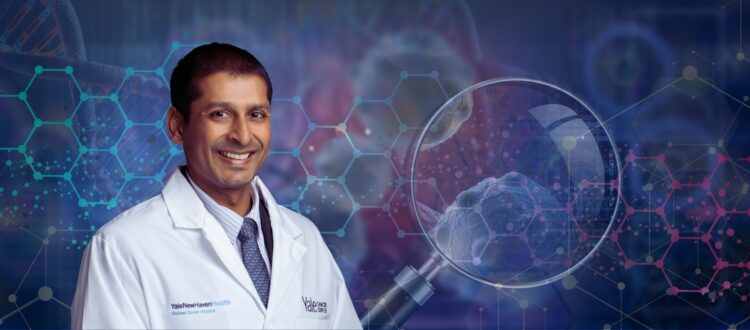Yale Scientist to Probe Causes of Early-Onset Gastric Cancer with Foundation Seed Grant
In many countries around the world, the incidence of gastric cancer has increased in people under the age of 40, even as cases of the disease and mortality are falling in older patients. Early-onset stomach tumors are known to have diverse causes, symptoms and molecular characteristics, but they’re so poorly understood that oncologists have little guidance on how best to treat young patients with gastric cancer.
Raghav Sundar, MD, PhD, hopes to change that. The Gastric Cancer Foundation has awarded a $100,000 seed grant to Sundar for a research project aimed at understanding the differences between early-onset and average-onset gastric cancer. Sundar, associate professor of medicine (medical oncology) at Yale School of Medicine and member of Yale Cancer Center, believes the insights he gains could inspire novel treatment approaches that will improve outcomes in young patients.
This grant – one of two $100,000 grants the Gastric Cancer Foundation awarded recently – is part of our mission to bridge the funding gap for researchers focused on gastric cancer who are in the early- and mid-stages of their careers. The seed grants are designed support research into novel diagnostics and treatments for this challenging disease, allowing researchers to gather valuable data they can use to apply for larger grants to further advance their projects.
Along with Luo Wenyi, MD, PhD, assistant professor of pathology, Yale School of Medicine, Sundar’s first goal is to define how the expression of eight specific biomarkers in gastric tumors differs between early-onset and average-onset cancer. The biomarkers include tumor targets such as HER2 and CLDN18.2, as well as immune biomarkers like PD-L1. His team also plans to characterize the tumor microenvironment in early- and average-onset gastric cancer, specifically focusing on immune cells.
“The current thinking is that it’s not just the tumor cells, but also the immune cells and the connective tissue sitting around the tumor – what we call the tumor microenvironment – that drive the tumor to grow,” Sundar said. “New technology allows us to understand those cells in ways that might actually explain why they cause cancer growth.”
Sundar’s team plans to assemble around 200 gastric tumor samples and adjacent normal tissue, curated from various countries across the world, including the United States, Italy, Japan and South Korea, with about 30% of the samples coming from people who were diagnosed before the age of 50. They will use advanced imaging technologies to study biomarker expression and special distribution of cells in both cancerous and normal tissues. They will then correlate the data they collect to clinical outcomes.
Ultimately, Sundar hopes his findings will help guide treatment regimens for young patients. “A lot of trials have looked at adding targeted therapies or immunotherapy to chemotherapy, but there’s a lot of confusion. If a tumor expresses two different targets, what’s the best treatment?” he said. The molecular profiling performed in the study could help identify subgroups of patients who are most likely to respond to targeted therapies or immunotherapy, he said.
Sundar joined Yale this year from the National University of Singapore, where he was a translational physician-scientist in the Singapore Gastric Cancer Consortium. The consortium brings together researchers from many different disciplines to study new approaches to gastric cancer. He is an expert in the genetics of gastric cancer and looks forward to leading the Gastroesophageal Cancer program at the Center for Gastrointestinal Cancers at Smilow Cancer Hospital and Yale Cancer Center, while continuing to treat patients.
Sundar added that he is grateful to the Gastric Cancer Foundation for supporting his project.
“Without your support, we would not be able to identify better treatment options to improve the care for patients suffering from this dreadful disease,” he said. “I’m very hopeful that the data we generate will directly impact patients.”

